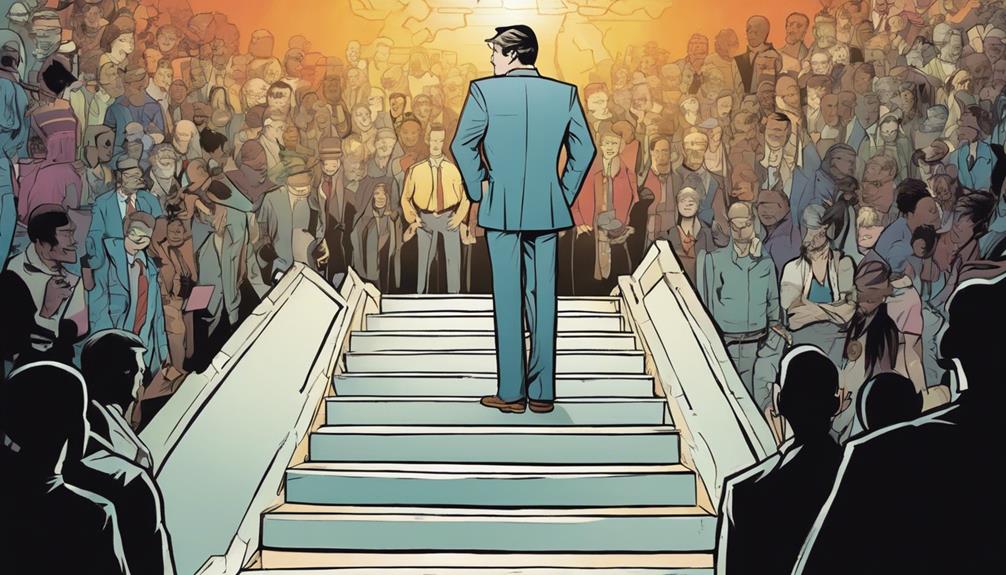UNTUCKit's journey from skepticism to success showcases the power of innovation and determination. You see, founders Chris Riccobono and Aaron Sanandres faced significant doubts about their untucked shirt concept. Despite these challenges, they secured funding and focused on quality while keeping operations lean. Their commitment to customer feedback and minimalistic retail environments boosted market appeal. Sales skyrocketed, with revenue projections exceeding $300 million in 2022. As they expand internationally, UNTUCKit proves that adaptability is key in business. If you're curious about the strategies that fueled their growth, there's plenty more to explore.
Key Takeaways
- UNTUCKit was founded in 2010 by Chris Riccobono and Aaron Sanandres, focusing on shirts designed specifically to be worn untucked.
- The brand overcame initial investment skepticism by securing $150,000 in funding despite doubts from older and younger investors about market viability.
- By maintaining lean operations and valuing customer feedback, UNTUCKit improved product quality and ensured financial stability during early growth.
- Retail expansion through minimalistic store designs and strategic locations boosted brand visibility and customer loyalty, adapting effectively to pandemic challenges.
The Founding of UNTUCKit
UNTUCKit was born from a simple yet powerful realization: men needed shirts designed specifically to be worn untucked. You mightn't have thought much about it, but traditional shirts often just don't cut it for a laid-back look.
In 2010, Chris Riccobono teamed up with his Columbia friend, Aaron Sanandres, to bring this idea to life. They faced the challenging task of maneuvering shirt manufacturing in New York's Fashion District, yet their determination never wavered.
Despite limited funds, they focused on creating quality samples that met the untucked demand. You can appreciate how they honed in on this niche, laying the groundwork for a brand that would redefine casual men's fashion while capturing the essence of comfort and style.
Overcoming Investment Skepticism

Securing investment for a groundbreaking idea like UNTUCKit often meant maneuvering through a minefield of skepticism from potential backers. You faced doubts, particularly from older investors who struggled to grasp the concept of untucked shirts, while younger investors questioned market viability.
Despite criticism of the brand name for lacking sophistication, you stood firm, recognizing its distinctiveness and SEO advantages.
With only $150,000, you launched UNTUCKit on a shoestring budget, opting for a frugal marketing strategy that emphasized direct consumer engagement. You understood that overcoming skepticism required clear communication of your vision and the brand's unique selling points.
Your resilience and commitment to the concept ultimately helped turn doubt into confidence, paving the way for UNTUCKit's success.
Lean Operations for Growth

By prioritizing lean operations, you managed to minimize expenses and protect equity while fueling UNTUCKit's growth. You focused on four key strategies:
- Eliminating unnecessary overhead: Operating without a physical office allowed you to cut costs effectively.
- Maintaining full-time jobs: You continued your employment until UNTUCKit reached significant revenue, ensuring financial stability.
- Valuing customer feedback: Despite initial product quality issues, you listened to customers and adapted accordingly.
- Avoiding heavy initial marketing: By not overspending on marketing, you cleverly avoided drawing attention to product flaws, allowing organic growth.
These strategies not only preserved your resources but also laid a strong foundation for UNTUCKit's impressive journey toward success.
Market Appeal and Trends

The appeal of UNTUCKit shirts lies in their ability to offer a casual yet polished look, perfectly suited for today's diverse body types and changing work attire trends.
You'll appreciate how the specially chosen fabrics resist wrinkling, ensuring you look sharp even when untucked.
With the shift towards casual work environments post-pandemic, UNTUCKit's popularity has soared—sales doubled from May to July 2021, surpassing pre-pandemic levels. Revenue projections for 2022 are over $300 million, reflecting the brand's strong market demand.
As you explore in-person shopping experiences, you'll find their retail spaces designed with minimalism in mind, catering specifically to men's fashion preferences. This strategic approach embodies UNTUCKit's commitment to evolving alongside consumer needs.
Retail Expansion Strategies

UNTUCKit's strategic decision to open brick-and-mortar stores reflects a response to customer preferences for in-person shopping experiences. You'll find that these retail spaces not only enhance brand visibility but also foster customer loyalty.
Here are some key strategies they're implementing:
- Minimalistic Design: Stores cater specifically to a male clientele, creating a comfortable shopping environment.
- Location Selection: UNTUCKit focuses on high-traffic areas, ensuring maximum exposure to potential customers.
- Adaptability: They negotiate leases and defer payments, adapting to challenges posed by the pandemic.
- International Expansion: Plans are underway to reach global markets, signaling confidence in brand resilience.
Lessons in Business Resilience

Opening brick-and-mortar stores during challenging times teaches valuable lessons in business resilience and adaptability.
You'll learn that flexibility is vital; adjusting your strategies based on real-time feedback can keep your business afloat.
When faced with unexpected obstacles like lockdowns, negotiating leases and deferrals becomes essential.
Embrace collaboration with landlords and other businesses to navigate these hurdles together.
A minimalistic retail design can cater specifically to your target audience, enhancing their shopping experience while reducing costs.
You'll also discover the importance of maintaining a frugal mindset, ensuring that every expenditure aligns with your core values.
Broader Insights for Entrepreneurs

Embrace adaptability and innovation as essential elements for steering through the challenges of entrepreneurship. As you navigate this journey, consider these insights:
- Stay Flexible: Market trends shift quickly; being open to change can set you apart.
- Focus on Feedback: Listen to your customers; their input can guide product improvements and innovation.
- Leverage Resources: Utilize available support systems, from mentorship programs to online communities, to enhance your skills.
- Build a Strong Brand: Create a distinct identity that resonates with your target audience; a unique brand can foster loyalty.
Conclusion
UNTUCKit's journey from skepticism to success is a demonstration of the power of belief and resilience in entrepreneurship. After facing initial skepticism from investors and industry experts, UNTUCKit’s founder Chris Riccobono and his team remained steadfast in their belief in the product and the brand. This unwavering belief in their vision ultimately led them to develop a successful and popular line of untucked shirts, proving their initial doubters wrong. The college professor’s shocking win revealed the untapped potential of the untucked shirt market and solidified UNTUCKit’s place as a major player in the fashion industry.
With over 80 retail locations and a thriving online presence, the brand has redefined casual wear for men.
By embracing innovation and remaining adaptable, UNTUCKit not only carved out a unique niche but also inspired countless aspiring business owners.
Remember, even the most outlandish ideas can thrive with the right vision and determination.
Keep pushing forward; your success story could be next!









